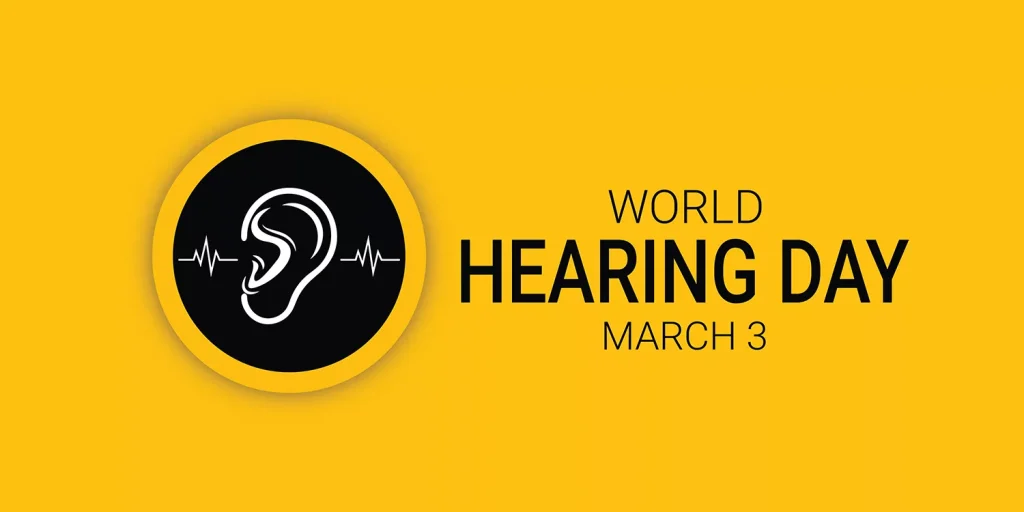World Hearing Day 2026: Empower Yourself to Protect and Improve Your Hearing

Hearing plays a vital role in our daily lives, enabling one to communicate, connect, and enjoy life to the fullest. Yet, millions of people worldwide face the challenge of hearing impairment, often without knowing that timely care and preventive measures can help preserve or restore their hearing. Over 430 million people worldwide live with hearing loss, and the numbers continue to grow due to factors such as aging, noise exposure, infections, and untreated ear problems.
Table of Contents
ToggleWorld Hearing Day: A Global Movement against Hearing Impairment
Observed every year on the 3rd of March, World Hearing Day serves as a reminder to prioritise hearing care. The day encourages individuals to take action by understanding the importance of early detection, prevention, and treatment. To help, this article will explore the significance of World Hearing Day, share practical tips for protecting your hearing, and provide useful insights on how to prevent hearing loss and seek the right treatment solutions.
Significance of World Hearing Day
World Hearing Day is an important global event that raises awareness about hearing loss and the crucial role hearing care plays in maintaining overall health. It aims to educate individuals about the preventable causes of hearing loss and the importance of early intervention. The day encourages governments, healthcare providers, and individuals to act collectively. It calls for greater access to affordable hearing care services, better early detection programs, and improved hearing protection efforts. This day also emphasizes the importance of education and empowerment, enabling people to make informed choices about their hearing health and improve their quality of life.
By dedicating one day each year to hearing health, the world can unite to promote prevention, treatment, and awareness in efforts to combat hearing loss and improve the lives of millions of people who may be affected.
What is Hearing Loss?
Hearing loss occurs when there is a partial or complete inability to hear sounds in one or both ears. It can affect people of all ages and may develop gradually or suddenly, depending on the cause. While some types of hearing loss are preventable, others require timely hearing loss treatment to improve quality of life.
Types of Hearing Loss
- Conductive Hearing Loss: Caused by blockages in the outer or middle ear, such as earwax buildup, ear infections, or fluid accumulation. It is often treatable with medical or surgical intervention.
- Sensorineural Hearing Loss (SNHL): Results from damage to the inner ear (cochlea) or auditory nerve. It is usually permanent and caused by aging, genetic factors, or prolonged exposure to loud noise.
- Mixed Hearing Loss: A combination of conductive and sensorineural hearing loss, affecting both the outer/middle ear and inner ear/auditory nerve.
- Noise-Induced Hearing Loss (NIHL): Caused by prolonged exposure to loud sounds or sudden explosive noises.
How Hearing Loss Affects Daily Life
Hearing impairment can lead to:
- Difficulty understanding conversations, especially in noisy environments.
- Social isolation and communication struggles, leading to frustration and withdrawal.
- Cognitive decline in older adults, increasing the risk of dementia.
- Reduced work or academic performance, affecting productivity and learning.
Many people ignore early signs of hearing loss, assuming it is temporary. However, timely intervention can prevent further deterioration and improve hearing health.
What are the Early Signs of Hearing Loss?
Hearing loss often develops gradually, making it difficult to notice in its early stages. However, recognising the early signs of hearing loss is crucial for seeking timely intervention and preventing further deterioration.some of the common signs of hearing loss include:
- Difficulty understanding speech, especially in noisy environments.
- Frequently asking others to repeat themselves or speak louder.
- Turning up the volume on the TV or phone higher than usual.
- Struggling to hear high-pitched sounds, such as doorbells, alarms, or children’s voices.
- Muffled or distorted sounds, making conversations unclear.
- Ringing in the ears (tinnitus), which may indicate auditory nerve damage.
- Feeling isolated or avoiding conversations due to hearing difficulties.
Hearing loss can worsen if left untreated, affecting communication, mental health, and overall quality of life. Seeking medical advice at the first signs of hearing impairment can help identify the cause and explore hearing problem solutions before it progresses further.
When to Seek Medical Attention for Hearing Loss?
While mild hearing difficulties may seem manageable at first, certain symptoms indicate the need for immediate medical attention. Delaying treatment can worsen hearing impairment and affect daily communication, work, and mental well-being.
Signs That Require a Doctor’s Consultation
If you experience any of the following symptoms, consult an ENT specialist or audiologist as soon as possible:
- Sudden hearing loss in one or both ears, especially without any apparent cause.
- Persistent ringing, buzzing, or whistling sounds (tinnitus) that interfere with daily life.
- Ear pain, pressure, or dizziness, which may indicate an underlying ear infection or condition.
- Difficulty hearing conversations even in quiet environments.
- Rapidly worsening hearing loss over weeks or months.
- Ear discharge or bleeding, which may suggest infection or injury.
- Balance problems or vertigo, which could be linked to inner ear disorders.
Hearing Loss in Children and Older Adults
- Children: If a child does not respond to sounds, has delayed speech development, or struggles with school communication, a hearing test is essential.
- Older adults: Age-related hearing loss (presbycusis) is common, but regular hearing assessments can help manage the condition early.
What to Expect During a Hearing Assessment?
A doctor may perform the following tests to diagnose hearing impairment solutions:
- Audiometry tests to measure hearing sensitivity.
- Tympanometry to check for eardrum problems.
- MRI or CT scans if structural issues or nerve damage are suspected.
If diagnosed with hearing loss, various treatment options—such as hearing aids, cochlear implants, or medical treatments—can help improve hearing and quality of life.
What are the Treatment options Available for Hearing Loss?
Hearing loss can be managed effectively with various treatment solutions, depending on the cause and severity. Early intervention plays a crucial role in improving hearing and maintaining quality of life. Below are some of the most common and advanced hearing impairment solutions.
1. Hearing Aids: The Most Common Solution
For individuals with mild to moderate hearing loss, hearing aids amplify sound and enhance clarity. Types of hearing aids include:
- Behind-the-ear (BTE): Suitable for all ages and hearing loss levels.
- In-the-ear (ITE): Custom-fit and more discreet.
- Completely-in-the-canal (CIC): Nearly invisible, best for mild hearing loss.
Modern hearing aid solutions come with features like Bluetooth connectivity, noise reduction, and rechargeable batteries for convenience.
2. Cochlear Implants: For Severe or Profound Hearing Loss
For individuals with severe hearing loss, cochlear implants bypass damaged parts of the ear and send signals directly to the auditory nerve. This is recommended when hearing aids are no longer effective.
3. Bone-Anchored Hearing Systems (BAHA)
This implantable device is beneficial for individuals with conductive or mixed hearing loss, particularly if the outer or middle ear is damaged.
4. Medical and Surgical Treatments
- Ear Infections: Hearing loss caused by chronic infections may improve with antibiotics or minor surgery.
- Earwax Blockage: Simple removal of excessive earwax can restore hearing.
- Otosclerosis Surgery: If a bone abnormality in the middle ear is causing hearing loss, stapedectomy surgery can help.
5. Assistive Listening Devices (ALDs)
These devices help improve hearing in specific situations, such as watching TV, attending meetings, or talking on the phone. Examples include FM systems, amplified phones, and TV listening devices.
6. Lip-Reading and Auditory Training
In cases where hearing cannot be fully restored, speech therapy and auditory training can help individuals adapt and communicate effectively.
With advancements in hearing problem solutions, people with hearing loss can lead fulfilling lives.
How to Prevent Hearing Loss?
Hearing loss is often preventable, especially when caused by loud noise exposure, infections, or poor ear hygiene. By adopting the right habits, you can protect your hearing and reduce the risk of long-term damage.
1. Avoid Loud Noise Exposure
- Limit exposure to loud environments like concerts, factories, or construction sites.
- Follow the 60/60 rule—listen to music at no more than 60% volume for no more than 60 minutes at a time.
- If you work in a noisy setting, wear noise-cancelling earmuffs or earplugs.
2. Use Hearing Protection Devices
- Earplugs: Affordable and effective for concerts, traffic noise, and loud work environments.
- Noise-cancelling headphones: Reduce background noise without needing to increase volume.
- Custom-fitted ear protection: Best for professionals exposed to constant loud noise.
3. Maintain Good Ear Hygiene
- Avoid using cotton swabs or sharp objects to clean the ears—they can push earwax deeper or damage the eardrum.
- Clean ears naturally by allowing wax to exit on its own or using a doctor-approved earwax softener.
4. Protect Against Infections
- Keep ears dry to prevent bacterial or fungal infections, especially after swimming.
- Avoid inserting unclean objects (like earphones or hearing aids) without proper sanitation.
- Treat ear infections promptly to prevent long-term damage.
5. Get Regular Hearing Check-Ups
- Schedule a hearing test annually if you are at risk (e.g., frequent noise exposure, family history of hearing loss). Children and older adults should have periodic hearing assessments to detect early changes.
6. Manage Health Conditions That Affect Hearing
- Conditions such as diabetes, hypertension, and cardiovascular diseases can impact hearing health. Maintain a healthy diet, stay active, and manage stress to improve blood flow to the ears.
Hearing loss is not always reversible, but with proper hearing protection tips and lifestyle changes, you can safeguard your hearing for life.
Conclusion
Hearing health is an essential part of overall well-being, yet hearing loss often goes unnoticed until it significantly impacts daily life. World Hearing Day 2025 serves as a reminder that early detection, preventive measures, and timely treatment can help maintain good hearing health for years to come. If you or a loved one is experiencing hearing difficulties, don’t wait until it worsens. Graphic Era Hospital offers expert consultation, comprehensive hearing assessments, and personalized treatment solutions to help you hear better.
Book an appointment at Graphic Era Hospital today and take the first step toward protecting your hearing health!
Frequently Asked Questions (FAQs)
Can stress and anxiety cause hearing loss?
Yes, chronic stress and anxiety can contribute to hearing problems. High stress levels can lead to reduced blood circulation to the inner ear, which may result in temporary or even permanent hearing issues. Stress is also linked to tinnitus (ringing in the ears).
Does wearing earphones or headphones cause hearing loss?
Yes, listening to loud music through earphones or headphones for extended periods can lead to Noise-Induced Hearing Loss (NIHL). To prevent damage, follow the 60/60 rule: listen at no more than 60% volume for no more than 60 minutes at a time.
Can certain medications cause hearing loss?
Yes, some medications are ototoxic, meaning they can damage the inner ear and lead to temporary or permanent hearing loss. Common ototoxic drugs include certain antibiotics, chemotherapy drugs, diuretics, and high doses of aspirin. Always consult a doctor if you experience hearing changes after starting new medication.
Is hearing loss linked to dementia and cognitive decline?
Studies have shown a connection between untreated hearing loss and an increased risk of dementia and cognitive decline. When the brain struggles to process sounds, it can lead to mental fatigue and memory problems. Wearing hearing aids may help reduce this risk.
Can diet and lifestyle affect hearing health?
Yes, a healthy diet rich in vitamins and minerals (such as Omega-3 fatty acids, magnesium, and Vitamin B12) supports ear health. Regular exercise, avoiding smoking, and staying hydrated can improve blood circulation to the inner ear, helping maintain good hearing.
By Specialities
- Bariatric Surgery
- Cancer Care
- Cardiology
- Dental
- Dermatology
- Diabetes & Endocrinology
- Endocrinology and Diabetes
- ENT (Ear Nose Throat)
- Eye Care
- Gastroenterology
- Haematology
- Health Awareness
- Health Care
- Health Tips
- Hematology
- Hepatology
- Internal Medicine
- Mental Health and Behavioural Sciences
- Metabolic
- Neonatology
- Nephrology
- Neurology
- Nutrition & Dietetics
- Obstetrics & Gynaecology
- Oncology
- Ophthalmology
- Orthopaedics
- Paediatric
- Physiotherapy & Rehabilitation
- Plastic and Reconstructive Surgery
- Psychology
- Pulmonology
- Rheumatology
- Spine
- Urology
Recent Posts
- Heart Attack: Symptoms and Treatment
- World Obesity Day 2026: Understanding, Preventing, and Managing Obesity
- Bacterial and Viral Pneumonia: Causes, Symptoms, and Treatment Options
- World Hearing Day 2026: Empower Yourself to Protect and Improve Your Hearing
- Understanding Chickenpox: Early Signs, Treatment Options, and Recovery Tips
Need expert medical advice?
Share your details and our healthcare specialists will reach out to assist you.
By proceeding, you acknowledge and agree to our Privacy Policy, Terms of Use, and Disclaimer.



















